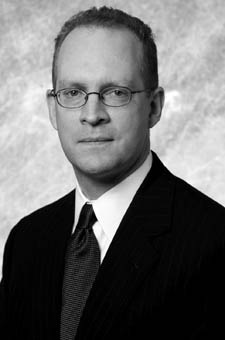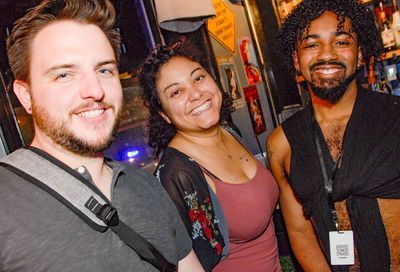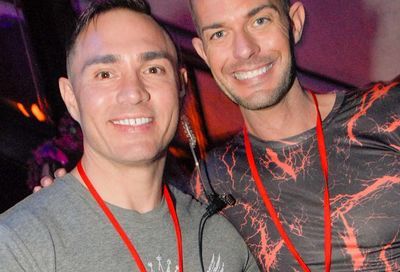”If you screwed your eyes shut and imagined a judge for the Federal Circuit, you would have a hard time imagining anyone better than Ed DuMont.”
President Obama rendered that exercise – suggested by former Clinton administration U.S. Solicitor General Seth Waxman – unnecessary when he nominated Edward C. DuMont, who is openly gay, for a seat on the U.S. Court of Appeals for the Federal Circuit. DuMont’s nomination was announced on Wednesday, April 14, and requires Senate approval.
 Edward DuMont
Edward DuMont
(Photo courtesy WilmerHale)
Although DuMont would be the first openly gay appellate judge in the United States, perhaps more noteworthy in the current political climate is the broad praise being given to the nominee – from Obama and Seth Waxman, DuMont’s colleague at the WilmerHale law firm, to more conservative legal thinkers such as appellate judge Richard Posner and libertarian-leaning law professor Eugene Volokh.
Waxman, who served as the top appellate litigator in the Justice Department during Clinton’s second term, called DuMont ”brilliant” and ”thoroughly professional” when talking on Thursday afternoon about his longtime co-worker. Saying that he looked ”wistfully” toward DuMont’s departure should the Senate approve the nomination, Waxman said, ”I will miss him as a colleague desperately.”
As is customary for presidential judicial nominees, DuMont declined to comment for this story.
A nominee to the Federal Circuit, DuMont would sit on a unique appellate court that has its cases determined by the subject of the litigation and not geography – as is the situation with other federal appellate courts. Among the cases the court hears are those dealing with patent law and certain types of lawsuits against the government.
As a federal appellate judge, only the U.S. Supreme Court could reverse DuMont’s decisions – which would be made as one of three judges on a panel hearing appeals. Like other federal judges, he would hold his position for a lifetime tenure.
In a statement announcing DuMont’s nomination, Obama said, ”Ed DuMont has distinguished himself throughout his legal career in both the public and private sectors. He possesses a keen intellect and a commitment to fairness and integrity that will serve him well as a judge on the Federal Circuit.”
The announcement did not mention DuMont’s sexual orientation, and the White House did not provide comment for this story. DuMont would only be the third known LGBT judge serving in the federal judiciary, which consists of more than 850 judgeships. The others are U.S. District Court Judge Deborah Batts, who was nominated for her judgeship in 1994 and sits in Manhattan, and U.S. District Court Judge Vaughn Walker, who sits in San Francisco and was not publicly known to be gay when nominated in 1989.
Because of the subjects heard by the court, some observers have suggested that DuMont’s nomination could be seen as less contentious than those to other appellate courts. As Volokh, who teaches at the UCLA School of Law, wrote at The Volokh Conspiracy, ”It is thus an unusually apolitical appellate court, which I hope means that Ed won’t run into the usual buzzsaw.”
Volokh – who describes DuMont as a friend – echoed Waxman’s comments on Thursday afternoon, referring to DuMont as the type of person you expect to be a judge – right out of ”central casting,” Volokh said. He added, ”He smiles more than central casting judges would do.”
Asked if sexual orientation would become an issue in DuMont’s confirmation hearings, Volokh said, ”I very much hope not,” adding that he believed people would be ”especially impressed by the apolitical, quality factors that Ed has going for him.”
When told of Volokh’s comments, Waxman said, ”I have the same hopes. Ed DuMont is such an obvious choice . . . it would be very dismaying to see anything get in the way of it.”
Because of the court’s jurisdiction, Volokh said he hoped it would be ”less likely that people are going to focus on this as a culture war” issue.
Referring to ”those who would focus on h is sexual orientation,” Volokh – noting that most who do so use ”sexual orientation as a proxy for political ideology” – said his hope for DuMont was that ”even for those who would care about that on the Supreme Court, let’s not care about that for the Federal Circuit.”]]>
A graduate of Stanford Law School, DuMont clerked for Judge Richard Posner of the Seventh Circuit Court of Appeals before going into private practice.
In response to an inquiry from Metro Weekly about DuMont’s nomination, Judge Posner wrote, ”DuMont was an excellent law clerk and has had a distinguished career since. He seems eminently qualified to be a member of the Federal Circuit.”
Posner added, in response to mention in the inquiry that DuMont would be the first openly gay appellate judge in the country, that he is ”not interested in people’s sexual orientation.”
After working for Posner, DuMont entered private practice before spending more than seven years in the Department of Justice as an assistant to the solicitor general, where DuMont first worked with Waxman.
DuMont has argued 18 cases before the Supreme Court, and Waxman described how DuMont’s facility with the ”astonishing, technical complexities” of modern inventions and the ”doctrinal issues” present in patent law make him ”such an obvious choice” for the Federal Circuit.
The Senate Judiciary Committee has not yet scheduled a confirmation hearing on DuMont’s nomination. Of Obama’s 18 other appellate nominees, seven have been approved by the Senate and have taken their judgeships. Five of the remaining 11 have been reported out of committee and await action by the full Senate. The remaining six – all nominated in February or March – await committee action.






















